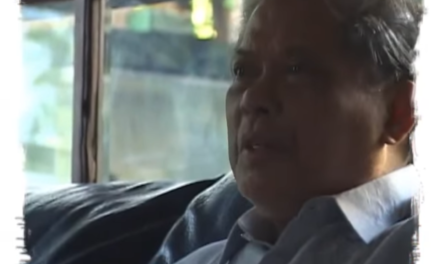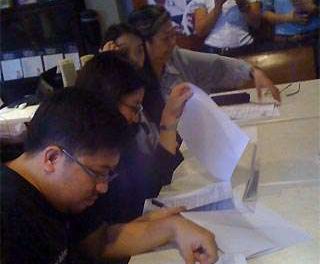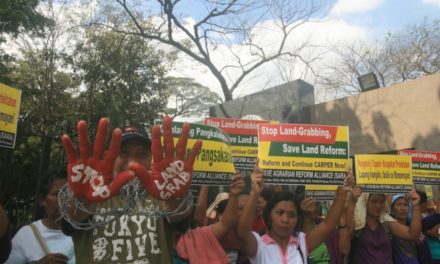A keynote address at the Rountable Discussion: EU-ASEAN Trade Relations, State of Play and Areas of Strategic Cooperation co-organized by the European Institute for Asian Studies (EIAS) and Philippinenburo in Brussels. 23 October 2015
Joseph Purugganan
Focus on the Global South
If we plot in a map what many people refer to as Mega FTAs- the US-led Transpacific Parntership Agreement, the TTIP between the EU and the US, the China driven Regional Comprehensive Economic Partnership Agreement or RCEP and the new proposal for a super mega FTA- The Free Trade Area of the Asia Pacific under the auspices of APEC, aside from highlighting the geo-political and economic nature of these agreements and the turf war that is happening among these big economies, we can see clearly the centrality of Asia in the whole picture.
People talk about the ‘Asia Pivot’ of the US, its effort to maintain military presence in the region as a way to counterbalance China’s influence, and many view the TPP as the economic dimension of that pivot.
Just before the TPP talks were concluded in Atlanta, this is what the USTR website had to say about the necessity of concluding that deal “The rules of the road are up for grabs in Asia. If we don’t pass this agreement and write those rules, competitors will set weak rules of the road, threatening American jobs and workers while undermining U.S. leadership in Asia.” The EU will undoubtedly fast track its own efforts in Asia for fear of being left out of in the region.
Why is Asia central?
Asia is valueable in the equation because of its growing market, many of the countries in East and Southeat asia continue to experience high growths from between 3-6 percent.
Asia is valued for its raw materials- countries like Cambodia, Laos and Myanmar for example are already starting to ease restrictions on foreign ownership and control of land, water and natural resources, and there continues to be a mad scramble for control over these resources.
Asia is also eyed and targetted because of its large number of State Owned Enterprises (SOE) that contribute anywhere between 15 % of GDP (in the case of Singapore and Malaysia), to as high as 30-38 % in the cases of China and
Vietnam respectively. There is now an agenda to reform the governance and ‘corporatize’ these SOEs.
It is no coincidence therefore that much of the news and the image that is projected of Asia or ASEAN in particular in these parts of the world, hammer on growth and expanding markets; on the richness of the region as a source of raw materials; and the opportunities the region presents for corporations.
What is not being discussed and which I think should really be highlighted as non-negotiables are the very same issues that arise from this aggressive pursuit of free trade and investment, of the corporate agenda in ASEAN.
So behind the growth, we see persistent poverty and high inequality.
Behind the extraction of raw materials, we see increasing conflicts over these resources pitting communities against corporations with governments taking the side of TNCs to protect investments. We see rising human rights abuses; killings of activitsts, of indigenous leaders, human rights defenders and criminalization of dissent. The spate of killings of indigenous peoples or Lumads, the collective term used for IPs in Mindanao, tragically underscore this point. Many of these killings are happening in areas where there are strong resistance against mining and other large scale development projects.
We also see a major push back and erosion of peoples rights in the region. We see further repression of peoples rights in Thailand under the rule of military junta, the fear and shrinking political space in Cambodia and Laos, and the continued human rights violations in the Philippines.
Another aspect that is not fairly discussed is the impact of the growth-driven model on nature and the environment in Asia, where the lives of many people and communities are dependent on. The ecological destruction in Asia is increasing further the vulnerability especially of the poor and marginlaized to the impacts of climate disaster.
These I think are the main issues or parameters by which any discussion on trade and investment should be anchored on- whether these agreements are instruments that advance the interest of people and nature?
Over the last 8 years we have endeavored to spearhead a campaign on the EU- ASEAN trade relations. Our campaign has consistently raised the following issues:
1. The FTA will exacerbate the development asymmetries and high inequality in the region
On the push for an ambitious agreement through a bilateral approach, the network pointed out the asymmetries that exist in the region, where you have countries like Singapore, Brunei and to a certain extent Malaysia- with high per capita incomes together with developing and least developed countries like Cambodia, Laos and Myanmar.
Highlighting the growing inequality in the region, the network has argued that “FTA would benefit the more advanced countries like Singapore who would get the lion share and within countries it is the corporate sector that would corner the benefits at the expense of peoples rights and the environment.”i Furthermore, a concern was raised that agreements like the EU-Singapore FTA, which includes a highly ambitious investment chapter, will be the template for trade and investment agreements with the Philippines.
2. The benefits of the agreement is anchored on false promises based on pre- crisis assumptions.
When you take a broader look at the trade numbers over the last 7 years (or since the economic crisis) they actually show EU imports from the Philippines registering negative growth rates with the exception of 2010 and 2011 where there was a marked improvement coming from the 31.1 percent contraction experienced in 2009 (a year after the crisis). This means that in actuality the capacity of the EU market to absorb increased exports from the Philippines, which is being promised under the FTA, must seriously be questioned.
We seriously need to examine as well the Philippines capacity to penetrate the EU market and what the impact of an FTA can realistically do to change this. The Philippines ranks at the bottom (45th place) of countries who export to the EU with exports representing a mere 0.3 percent of the EU market. Considering that around 65% of Philippine exports to the EU already benefit from duty-free treatment on an MFN basis.
3. The proposed FTA is a new generation FTA that entails much deeper commitments
Three main issues underscore the real nature of this agreement: intellectual property rights and impact on public health and access to medicines; heightened investment protection and its impact on policy space; and the impact of increased exports of fisheries on the livelihoods of small fishers and sustainability of our marine and coastal resources.
Intellectual Property Rights
There is a very real threat that EU-Philippines FTA would include provisions on intellectual property rights that will undermine peoples’ access to medicines. A highly restrictive IPR regime would go against the spirit and the letter of our national Cheaper Medicines Lawii and would ran counter to government’s own goal of ensuring the right to health. In a country where
Similar warnings have come from the United Nations Development Program (UNDP) and the UNAIDS program, which have come out strongly against these TRIPS plus provisions in FTAs and their impact on public health. The report concludes that “to retain the benefits of TRIPS Agreement flexibilities, countries, at minimum should avoid entering into FTAs that contain TRIPS-plus obligations that can impact on pharmaceuticals price or availability.”iii
In the case of the Philippines, where total health expenditures account for less than 4 percent of GDP, “Filipino households bear the heaviest burden in terms of spending for their health needs, with private out-of-pocket (OOP) expenditures reaching 56% of total health expenditures.”iv A restrictive IPR regime that would in any way delay the production and marketing of more affordable generic medicines would be a big threat to an already problematic public health situation in the Philippines.
Investment Chapter and ISDS
Another area of concern is the investment chapter in FTAs being pushed by the EU, which would afford greater protection and rights for corporations including the right to sue governments over certain policies and regulations. There is deep concern over the agenda of the EU to include investor to state dispute mechanism as an integral part of the investment chapter in its FTAs with ASEAN countries.
There are two high profile investment arbitration cases under the International Centre for the Settlement of Investment Disputes (ICSID) that pit the interests of the Philippines versus those of European corporations. Aside from the million dollar claims of corporations, litigating these cases already constitute a big burden on taxpayer’s money.
The German corporation Fraport has sued the Philippines twice over the cancelation of the contract over the construction of a new airport terminal. In both instances, the investment tribunal in this case the International Center for the Settlement of Investment Dispute (ICSID) under the World Bank, has ruled against Fraport on jurisdictional ground. The arbitration cost to the Philippines however in the first case amounted to around US$50 million in legal fees alone, financial resources that could otherwise have been used to support more pressing needs like disaster relief and rehabilitation or public education and health programs.
Fisheries
On the aspect of trade in goods, recent press reports based on a study on the fisheries agenda by the Philippine Institute for Development Studies or PIDS, the government think-thank, have identified the tuna sector as a potential winner in these talks. What is clear however and what has not been reported in the media is that the same study pointed to a negative impact on small fishers as the drive to increase tuna exports to the EU could exacerbate the degradation of our resource base.
Furthermore, there are existing government studies indicating the potential adverse impacts of resource depletion of Philippine tuna fisheries in case of increased tuna exports as a result of the trade agreement but there were no clear measures studied how these adverse impacts can be avoided; should the Philippines enter into the negotiations, the Philippines should have in place these fisheries resource rehabilitation measures in place up and running before anything else.
A related development in the case of fisheries is the strong push by the EU for compliance by the Philippines with its fisheries regulation on illegal, undocumented, unreported (IUU) fishing. The Fisheries Code of has been amended to include stronger provisions on IUU designed to accommodate EU regulations.
4. Lack of transparency and public participation. The absence of a coherent national negotiating framework that is anchored on solid economic, social and environmental cost-benefit analysis developed through genuine and meaningful public consultations
The EU has consistenly pointed to us that the problem of transparency and peoples participation is a problem we need to raise with our own governments and not the EU. I think the lack of democracy in TPP and the TTIP negotiations is further proof that this is clearly not the case. That even within the bastions of democracy- the EU and US, that people are still left out and shut out of these talks. The latest EU Trade Strategy seem to recognize the need to address this issue of transparency and participation, and it attempts to signal a commitment to reform the process by which trade and investment policies are governed wihtout actually overhauling the entire corporate driven trade agenda.
Looking forward to this discussion with all of you and hope that we will be able to define clear areas of strategic cooperation to push back the FTA and corporate agenda and scale up our efforts to promote the interest of people and planet.
Thanks you and good morning.
i Consolidated position paper of the EU-ASEAN FTA Network-Philippines. December 2014.
ii Republic Act 9502 otherwise known as the “Universally Cheaper and Quality Medicines Act of 2008.”
iii The Potential Impact of Free Trade Agreements on Public Health.Joint United Nations Programme om HIV/AIDS (UNAIDS).
2012. http://www.unaids.org/en/media/unaids/contentassets/documents/unaidspubl..
iv From Philippine National Health Accounts as cited in the Joint Position Paper : Defend The Right To Health And Access To Affordable Medicines! No To Trips Plus Provisions In Bilateral FTAs! by the EU-ASEAN FTA Network, Medicines Transparency Alliance (MeTA) Philippines, Inc., Coalition for Health Advocacy and Transparency (CHAT), Ayos na Gamot sa Abot-Kayang Presyo (AGAP) Coalition. 2011










